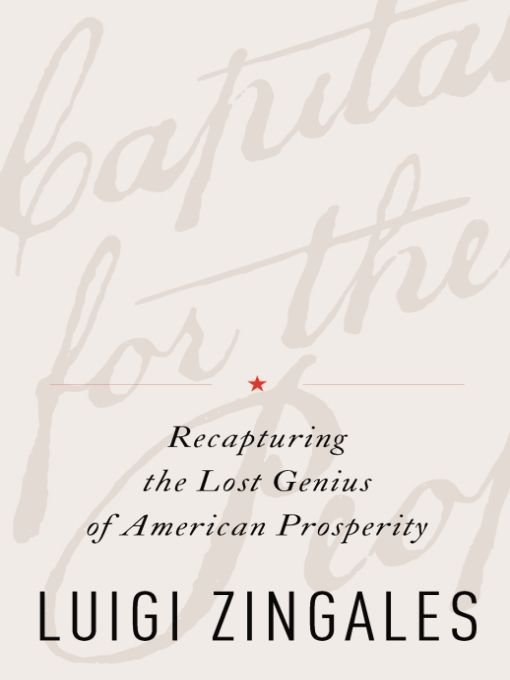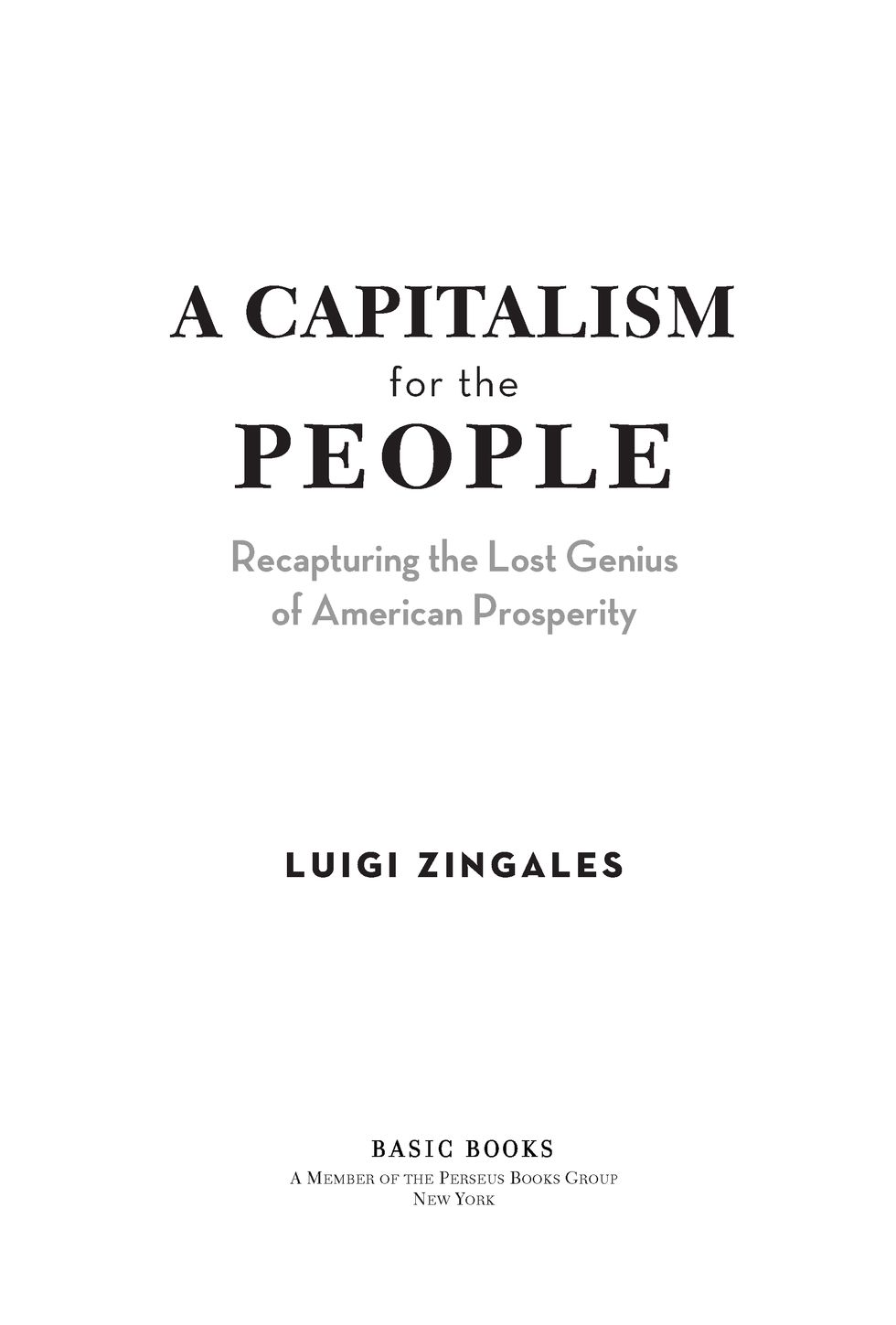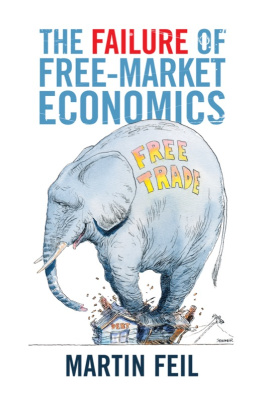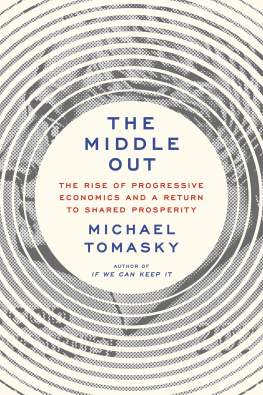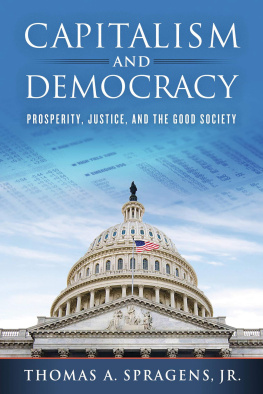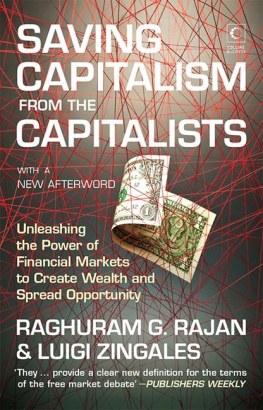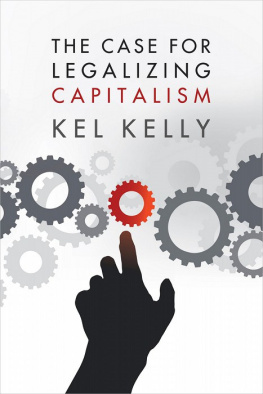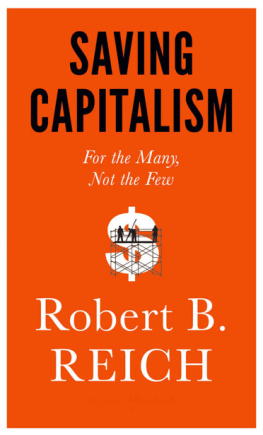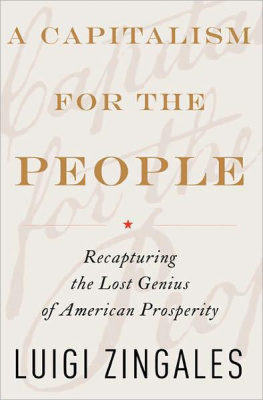Table of Contents
To my parents, who raised me with a belief in a just world.
Their example and teaching gave me the strength
to fight to transform their dream into reality.
PREFACE
AMERICANS ARE ANGRY. THEY ARE ANGRY AT BANKERS, who contributed to the financial crisis but didnt pay for it. They are angry at the ineffectual political establishment, which blamed the bankers but deserved at least as much blame for failing to rein them in. They are angry at an economic system that makes the rich richer and leaves the poor behind. They are angry because the ideal of a government of the people, by the people, for the people is at risk of perishing from the earth.
This anger has surfaced in many spontaneous movements: the demonstrations in front of executives houses, the activism of the Tea Party, the Occupy movement. Though these movements are united in their opposition to the status quo, one searches in vain among their writings and platforms for a workable alternative. While the Tea Party has successfully channeled the anger against government, it has failed to do so for the resentment against bankers. While the Occupy movement proclaims that it fights for the 99 percent, it has been unable to figure out how to conduct that fight.
What can I bring to this discussion? In theory, I am one of them: a professor of finance at a leading university and fortunate enough to be in the top 1 percent of the income distribution. Yet I am angry, too, and scared. Angry because the idea of free markets has been increasingly taken over by entrenched business interests, fundamentally altering the equilibrium of American democracy. Scared that Americans, in their justifiable anger about the way things have gone, will choose a path that brings an end to American capitalism as we know it. For all its defects, that capitalist system offers the best hope for the most people. It is a model that defenders of freedom all over the world look to for guidance.
While my academic training gives me a special understanding of American capitalism (including what is wrong with it), its another part of my experience that drove me to write this book. I am an immigrant to the United States. I came here in 1988 from Italy because I was trying to escape a system that was fundamentally unfair. Italy invented the term nepotism and perfected the concept of cronyism, and it still lives by both. You are promoted based on whom you know, not what you know. Americans were recently exposed to the corruption of the Italian system by Silvio Berlusconi, the tycoon-turned-politician who ran the country for nearly two decades. While Berlusconi represented an extreme, even by Italian standards, he was not an accident but the product of a degenerate system. I emigrated to the United States because I realized that it offered me an inestimably brighter future than my native country. And when I got to America in 1988, I wasnt disappointed; I experienced for the first time the inebriating feeling that any goal was within my reach. I had finally arrived in a country where the limits to my dreams were set only by my abilities, not by the people I knew.
Wherever you stand on the political spectrum, whether youre a conservative Republican or a liberal Democrat or somewhere in between, I would gently suggest that you have no idea what its like to live in a country where there is virtually no meritocracy and competition is considered a sin. Even emergency-room doctors in Italy are promoted on the basis of political affiliation instead of ability. Young people, rather than being told to study, are urged to carry the bag (fare il portaborse) for powerful people, in the hope of getting back some favors. Mothers push their daughters into the arms of the rich and powerful, seeing it as the only avenue of social promotion. The talent selection process is so broken that you easily find very smart people employed in very menial jobs and very mediocre people in powerful positions. Until 1990, companies in Italy could openly and legally collude to defraud their customers; they still collude today, but they are less open about it. The best way to get rich is to be politically connected and receive a government contract.
The only protesters against this system came from the radical Left, which was less interested in changing the system than in replacing it with a socialist one. In a country full of privileges based on birth, the Left, instead of fighting for equality of starting points, fought to eliminate all selection mechanisms, viewing them as discriminatory against the have-nots. One consequence of this was that universities were not selective in admissions. Regardless of your grades, you could get into any college you wanted, forcing all colleges toward lower standards. The unintended consequence of this egalitarianism was that it produced an undifferentiated mass of mostly ignorant graduates. Companies seeking workers resorted to hiring on the basis of the only system that works in the absence of credible sorting: personal connections.
While in college in Italy, I developed an interest in economics and hoped to study it at the graduate level and to become an academic. For the average college graduate in the United States, such a goal might require practicing for the GREs and analyzing various rankings to figure out what the best graduate programs were. Not in Italy. Many people, including my father, told me that if I wanted to have a university career, I had to pay my dues to some local professorto carry his bagwhich meant essentially working for free not only on his academic projects but also on his consulting ones. I decided instead to apply to universities in the United States. But even that plan did not seem promising, because I was unable to secure a letter of recommendation from the most famous professor at my college. When I had asked him to supervise my undergraduate thesis, he had declined, saying that he lacked the timedespite my excellent grades, and despite the fact that he had found the time to supervise a classmate of mine, who had the support of an influential person. When I later approached this professor for a recommendation, his secretary told me that he wrote letters only for the people he had advised. Thus, I was out of luck. I studied extra hard for the admissions tests, however, and I made it into MIT. In spite of my less than positive experience, I considered returning to Italy upon receiving my PhD from MIT. At the very time the University of Chicago was hiring me, an Italian professor asked me to withdraw my application from national competition for Associate Professor in Italy. I knew it was a long shot, but if I made it in Chicago as an assistant could I at least try to compete for a position as an associate in Italy? The worst that could happen to me was that my application would be discarded, right? No. I was told that they would write a terrible report on me that would stay on my record forever. The real reasonI suspectwas that in spite of my young age I had a better record than the local candidate who had paid his dues (after all, my father was right). They did not want me in the race, so they resorted to not-so-veiled threats.
I realized Italy was not for me. After six years, I received tenure at the University of Chicago. In Italy, the process would have taken more than twice as long. I was able to build a career without needing to trade on family connectionsor, worse, flattering people just because they had seniority. I owe more than my success to this country: I owe my life. I would not have survived the humiliations and frustrations of the Italian system.

